 |
 |
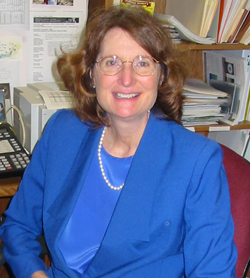
|
|
Lynne M. Haverkos, M.D., Pediatrician, Medical Officer, Child Development and Behavior Branch, Center for Research for Women and Children, National Institute of Child Health and Human Development (NICHD), National Institutes of Health (NIH)
|
1. I chose this career because...
2. My typical workday involves...
3. What I like best/least about my work...
4. My career goals are...
5. When I'm not working, I like to...
|
|
1. I chose this career because...
|
Back to Top

|
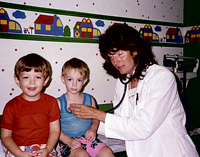
|
|
Lynne Haverkos enjoyed doing well child check-ups during her 14 years in private practice.
|
I chose to become a pediatrician because I wanted a challenging career in the medical field dealing with children and their parents. A pediatrician encompasses qualities of a medical detective, a counselor, and a healer. There is an element of intrigue in searching for signs and symptoms of diseases and solving diagnostic dilemmas. This is especially true with infants who can’t verbally assist the physician to identify the location of their problem. Pediatricians do a great deal of parent counseling as they teach them to become advocates for their children. Pediatricians serve as counselors for children in the battle against obesity, youth violence, and unintentional injuries. Pediatricians function as healers when they suture lacerations, dress wounds, and order lifesaving medications.
Choosing My Path
During high school, I really liked math and science, especially biology. My father was a schoolteacher and my mother was a secretary at the local university. Both of them valued education and encouraged me to pursue my dreams of going to college and on to medical school.
In college, I majored in biology and chemistry, the standard majors for premed students at my university. Medicine is an exciting field that involves a lot of reading and studying. I was a good student and enjoyed learning and searching for answers. The human body is amazing and trying to understand how it works, what things can go wrong, and how it is repaired is a lifelong quest for knowledge. I have always enjoyed interacting with kids and parents. My rotation in pediatrics during medical school convinced me that that’s where my heart belonged.
At one point, I briefly considered another career possibility. While traveling to the Florida Keys during Spring break with the college scuba team, I seriously contemplated a career in marine biology. Scuba diving opens up a whole new world for the diver and offers a variety of physical and mental challenges. Dating back to my earliest school years though, I had wanted to become a physician. So when I was accepted by the Medical College of Ohio, it was natural for me to follow that career path.
Education and Certification
- Bachelor of Arts, double major in Biology and Chemistry, Kent State University, Kent, Ohio
- Doctor of Medicine, Medical College of Ohio at Toledo, Ohio
- Pediatric internship and residency, Akron Children’s Hospital Medical Center, Akron, Ohio
- Subspecialty training in Ambulatory Pediatrics, Children’s Hospital of Pittsburgh, Pittsburgh, Pennsylvania
- Master of Public Health, Epidemiology, Graduate School of Public Health, University of Pittsburgh, Pittsburgh, Pennsylvania
- Board Certified in Pediatrics, Fellow in the American Academy of Pediatrics (FAAP)
Career Change: Private Practice to Medical Officer
After moving to Maryland, I joined a wonderful group of three highly competent pediatricians in Maryland, beginning a part-time career that lasted for the next 14 years. Our pediatric practice served as a site for several research studies, and also a weight loss program.
Serving as a community pediatrician was an emotionally rewarding endeavor, except when patients developed life-threatening illnesses and teens experienced the agony of substance abuse, mental illness, or unexpected pregnancies. I experienced a keen sense of satisfaction counseling patients, identifying and treating injuries and diseases, and interacting with newborns, toddlers, children, teens, young adults, and their parents. I tried to help parents recognize the unique potential of their children and the parents’ important role as caretaker, educator, and disciplinarian. I was always amazed and impressed by the unique bond between parents and their children and the adaptability and resilience of children.
In 1998, I made a giant career change and left my pediatric practice to work as a medical officer at the NIH. The change was prompted by the tiring 70-mile commute to and from the pediatric practice, the changing health care environment, and my desire to learn more about research and the research funding process. Reluctantly, I gave up my white coat and stethoscope for a computer and a job as a medical officer. I didn’t miss the long drive, but sorely missed the children and their parents.
The new job was like diving into an ocean with unfamiliar equipment and facing unexplored avenues of opportunity. Although the hours for the new position involved working 8:30 a.m. to 5:00 p.m., I became so entranced by the work that the hours passed by like minutes. Working full-time was not a problem. My job offered flexible hours, and I was able to attend school-related functions for my children. I was fortunate to have wonderful colleagues at the NICHD and found researchers in general to be a good group of people.
|
|
2. My typical workday involves...
|
Back to Top

|
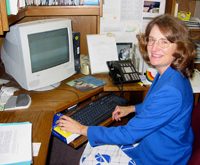
|
|
Lynne Haverkos accomplishes many of her daily administrative tasks at her desk.
|
My typical workday centers around my responsibilities as a program director for the Behavioral Pediatrics and Health Promotion Research program that is part of the Child Development and Behavior Branch of the National Institute of Child Health and Human Development (NICHD). The program supports research and research training grants in behavioral and developmental pediatrics, that focus on the role of behavior in health, growth, and development from fetus to young adulthood.
As program director, my major responsibilities are to:
- Oversee progress of funded projects
- Provide technical assistance to grant applicants
- Communicate with federal colleagues and researchers
- Attend conferences to keep abreast of current research and to network with investigators and applicants
- Attend the review of grant applications so that I may assist applicants as they navigate the NIH pathways to federal funding
Additional tasks are to:
- Serve on numerous trans-NIH committees and several trans-agency committees that involve sleep research, substance abuse, fetal alcohol syndrome, emergency medical services for children, and injury prevention
- Respond to email and phone inquiries from potential grant applicants
- Attend research conferences and give funding presentations
- Keep abreast of the current literature in the fields of adolescent risk behaviors, injury prevention, and health promotion/disease prevention
Work Schedules – Private practice vs. Science administration
My current work schedule has considerable flexibility and reflects the degree of autonomy that I enjoy. I generally work Monday through Friday, 8:30 a.m. to 5:00 p.m. In the past, I changed the hours so that I could attend some of my daughter’s high school events.
This schedule is quite a change from private practice when I worked three days a week and two Saturdays a month. The only exception to that schedule was in the summer. My kids swam on the local swim team. I had to be there to cheer for them. In private practice, I didn’t leave until my last patient was seen. On days when our office was open until 8:00 p.m., that occasionally meant getting home after 10:00 p.m. In private practice, appointments were offered six days a week and patients were seen on Sundays as well.
My Environment
My office is filled with books, research articles, and documents relating to the grant process and to conferences I have attended. There too, is a bandaged teddy bear with an arm in a sling, given to me by a former colleague. It reminds me of days filled with sick visits and well child check-ups.
I work with six other program directors and several support staff. In the summer we have the luxury of summer interns who assist us with certain tasks. My colleagues and I work collaboratively to cover our branch meetings, conferences, and grant reviews.
|
|
3. What I like best/least about my work...
|
Back to Top

|
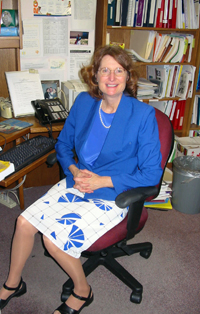
|
|
Lynne Haverkos is surrounded by many of the books, research journals, and documents she uses for the research grant review process.
|
What I like best about my work is interacting with research scientists from across the United States and abroad. I am awed by their dedication to science, and quest for knowledge. Reading research publications and learning about the cutting edge advances in behavioral pediatrics contribute to my high level of job satisfaction.
Assisting others has always been a top priority for me. In the past, this meant helping mothers and individual children. Now my attention focuses on adult researchers and although they aren’t as amusing as children, their innovative ideas can be just as entertaining. Knowing that I play a small part in the search for scientific evidence that may inform evidence based practice and policies, satisfies my desire to contribute to the health and welfare of our children and society.
What I like least about my work is recognizing significant and innovative research proposals, but not having adequate funds. It is hard to explain to investigators why we can’t fund their research projects.
|
|
4. My career goals are...
|
Back to Top

|
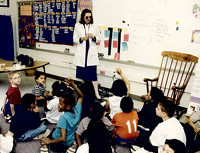
|
|
Lynne Haverkos volunteered in her child's classroom to teach students about good health practices.
|
My career goals are to:
- Prepare presentations on risk behaviors in adolescents based on current research findings. Reviewing the literature frequently will allow me to better recognize gaps in scientific knowledge and permits me to better assist investigators.
- Attend a pediatric board review, in the next several years, to stay current with updates in pediatric practice.
- Take courses on statistical analyses and the design of clinical trials
I anticipate working at the NIH until I retire. When I’m not traveling with family, I plan on
doing volunteer work with children.
|
|
5. When I'm not working, I like to...
|
Back to Top

|
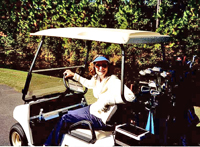
|
|
Lynne Haverkos enjoys playing golf in her free time.
|
When I’m not working, I like to play tennis and golf, and walk my two dogs. I also collect cookbooks and scientific articles.
|
|
|
|
 |